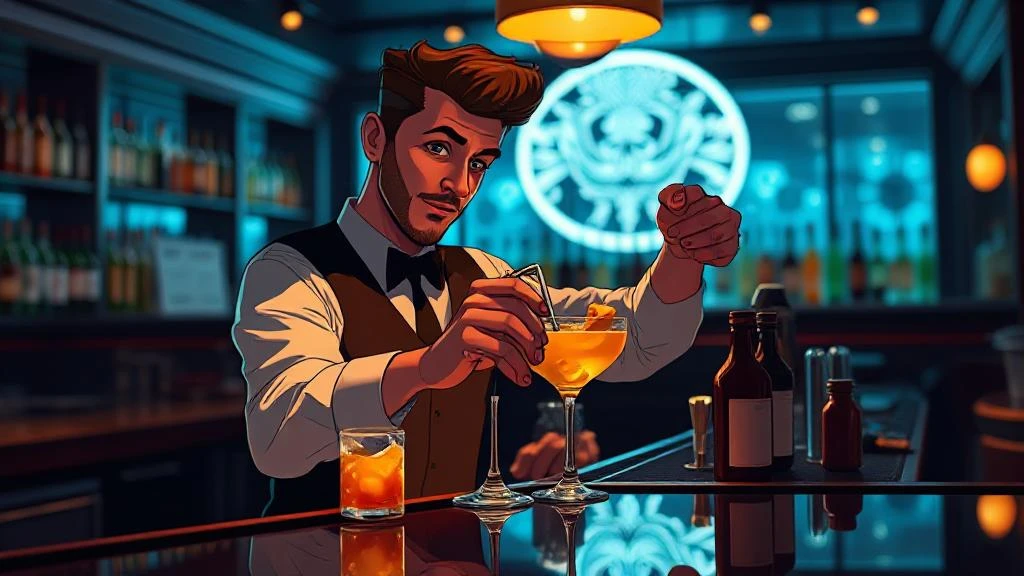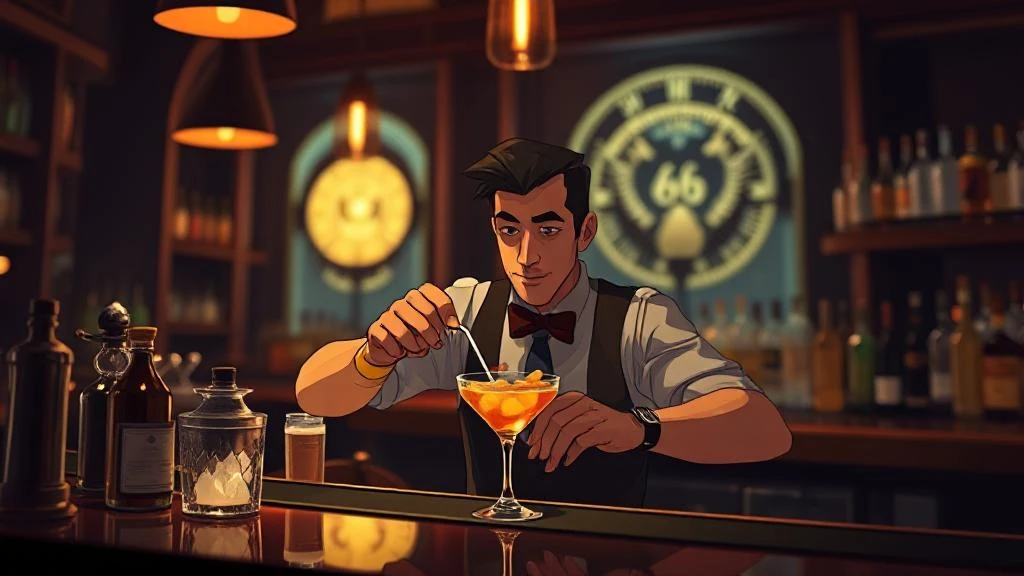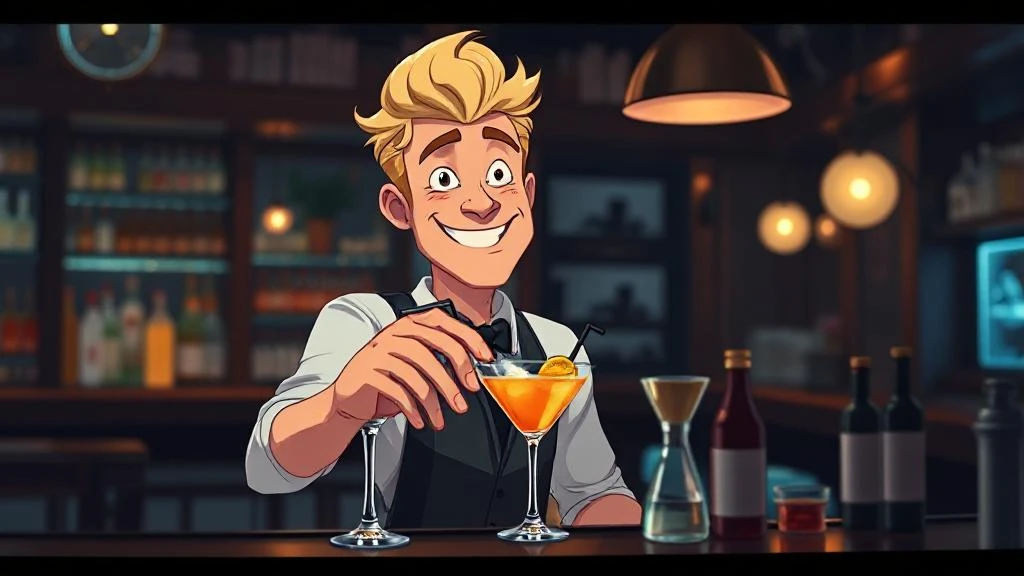Giuseppe Cipriani revolutionized cocktail culture when he opened Harry’s Bar in 1931. His simple philosophy and dedication to quality hospitality created a legendary venue that still attracts celebrities and cocktail enthusiasts worldwide.
The Bartender Who Changed Venice Forever
Giuseppe Cipriani (1900-1980) transformed from a humble hotel bartender into one of history’s most influential figures in cocktail culture.
As a barman at Venice’s Hotel Europa-Britannia in the late 1920s, Giuseppe became known around town for his generosity and exceptional service. His kindness to a struggling American patron would change his life forever.
In 1931, Harry Pickering, a wealthy young Bostonian, returned to repay a 10,000 lire loan Giuseppe had given him years earlier. Pickering brought not only repayment but an additional 40,000 lire to help Giuseppe open his own bar.
On May 13, 1931, Harry’s Bar opened its doors in a former rope warehouse on Calle Vallaresso. Giuseppe named it after his American benefactor, establishing what would become one of the world’s most famous cocktail destinations.
Career Journey and Professional Background
Giuseppe’s path to bartending excellence began in Italy’s grand hotels. He started his career as a waiter in the grand hotels of Italy and elsewhere, then settled in Venice as a barman, first at the Hotel Monaco, then at the Hotel Europa-Britannia.
His training in these prestigious establishments taught him the fundamentals of hospitality that would later define Harry’s Bar’s approach to service.
Career Milestones:
- Late 1920s: Bartender at Hotel Monaco and Hotel Europa-Britannia
- 1931: Opened Harry’s Bar in Venice
- 1934: Opened second venue, an inn on a Venetian island
- 1948: Created the Bellini cocktail
- 1950: Invented Carpaccio dish
- 1956: Founded Hotel Cipriani
Harry’s Bar became the place where writers, painters, artists, aristocrats, kings and queens would meet. Among them there were: Barbara Hutton, Katherine Hepburn, Gary Cooper, Giancarlo Menotti, Peggy Guggenheim, Orson Welles, Frank Lloyd Wright, Joe di Maggio, Truman Capote and Ernest Hemingway.
Mixology Philosophy and Signature Style
Giuseppe’s approach to bartending centered on simplicity and quality ingredients. His philosophy emphasized serving customers as he would want to be served himself.
Core Principles:
- Simplicity over complexity
- Quality ingredients above all
- Genuine hospitality without pretension
- Consistency in every drink
True luxury resides in simplicity, and that which is simple is free of impositions. This principle guided every aspect of Harry’s Bar operations.
Giuseppe believed in creating an atmosphere where customers felt welcomed rather than overwhelmed by elaborate decor or pretentious service. His philosophy was to establish a place where the customer never feels oppressed by décor, treats customers as guests, be humble, kind, and unpretentious.
Signature Cocktails and Culinary Innovations
The Bellini Cocktail
The Bellini was invented sometime between 1934 and 1948 by Giuseppe Cipriani. He named the drink the Bellini because its unique pink color reminded him of a painting by 15th-century Venetian artist Giovanni Bellini.
Giuseppe experimented by pureeing small white peaches and adding some Prosecco. Those who tested this new concoction gave it rave reviews, and he was encouraged to pursue his alchemy.
The cocktail emerged from Giuseppe’s deep appreciation for art and local culture. After seeing Giovanni Bellini’s lifework collection on display at the Ducal Palace in Venice in 1948, Giuseppe Cipriani used the artist’s namesake to honor the ideals of beauty and freedom.
Carpaccio Creation
Giuseppe’s culinary innovation extended beyond cocktails. When learning that one of Harry’s Bar Royal patrons, the countess Amalia Nani Mocenigo’s doctor had recommended that she eat raw meat, Giuseppe Cipriani created a dish made from thinly slices of raw beef sirloin.
He named this dish after Vittore Carpaccio, the Venetian painter known for his distinctive red and white color palette.
Classic Cocktail Techniques
Giuseppe developed unique preparation methods that set Harry’s Bar apart. The bar uses lemon juice instead of lime in their Daiquiris because that is what Giuseppe Cipriani did. (In the 1930s, limes were hard to come by in Venice.)
His attention to detail extended to every aspect of drink preparation, ensuring consistency that kept patrons returning decade after decade.
Industry Impact and Legacy
Giuseppe’s influence on the hospitality industry extends far beyond cocktail creation. He established service standards that became benchmarks for fine dining establishments worldwide.
Key Contributions:
- Created the modern aperitivo culture with the Bellini
- Developed service protocols emphasizing warmth over formality
- Established Venice as a cocktail destination
- Influenced generations of bartenders through his simple-yet-perfect approach
According to research published in the Journal of Food Service, establishments that follow Giuseppe’s simplicity-focused approach show higher customer satisfaction rates than those emphasizing complex presentations.
In 1956, he founded the Belmond Hotel Cipriani in Venice. It was named the best hotel in the world in June 2023 on the Top 1,000 World’s Best Hotels.
Wartime Character and Values
Giuseppe’s character truly showed during World War II. Cipriani’s business suffered during the war. He recalled the Nazi occupiers asking him which of his customers were Jews, and replying that he did not know: “They were all Italians to me.”
This response demonstrated the inclusive values that made Harry’s Bar a sanctuary for people from all backgrounds.
Famous Patrons and Cultural Influence
Out of a stellar clientele – Orson Welles, Peggy Guggenheim, Humphrey Bogart, Lauren Bacall and Winston Churchill were just a few of Harry’s visitors – it is Hemingway who is perhaps most associated with Harry’s Bar.
Ernest Hemingway became not just a customer but a friend. Cipriani counted the great man as a friend. He kept Locanda Cipriani open one winter so that Hemingway could shoot ducks and write his novel, Across the River and Into the Trees. Hemingway, in turn, referenced Harry’s in his novel, and taught Cipriani his favoured style of martini, the potent, 15:1 Montgomery.
Modern Recognition and Awards
In 2001, the Italian Ministry of Cultural Heritage declared Harry’s Bar a national landmark, calling it “a witness to the twentieth century in Venice”.
This recognition acknowledges Giuseppe’s contribution to Italian cultural heritage and international hospitality standards.
Contemporary Relevance
Giuseppe’s principles remain relevant in today’s cocktail scene. Studies from Cornell University’s School of Hotel Administration show that bars emphasizing simplicity and quality ingredients outperform those focused solely on novelty.
Modern bartenders worldwide study Giuseppe’s techniques and philosophy. His emphasis on using the finest available ingredients rather than covering poor quality with complexity resonates with today’s craft cocktail movement.
Family Legacy Continues
Giuseppe’s son Arrigo (born 1932) carried forward his father’s vision. Says Arrigo, Giuseppe’s son, still spry although pushing 80: “My father taught me everything, because he invented everything. Truly, I think I am one of his inventions.”
The Cipriani family continues operating establishments worldwide, maintaining Giuseppe’s standards across four generations.
Enduring Philosophy
Giuseppe Cipriani’s approach to hospitality remains timelessly relevant. His belief that genuine service creates lasting relationships transformed a simple bar into a cultural institution.
The keys to the success of this tiny bar were: service, freedom, and lack of imposition.
Your next visit to any quality cocktail bar likely reflects Giuseppe’s influence. His dedication to simplicity, quality ingredients, and genuine hospitality continues shaping how the world experiences fine drinks and dining.
Whether you’re enjoying a Bellini at brunch or appreciating a perfectly prepared classic cocktail, remember Giuseppe Cipriani – the humble bartender who changed cocktail culture forever.











